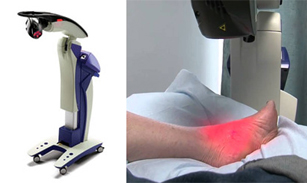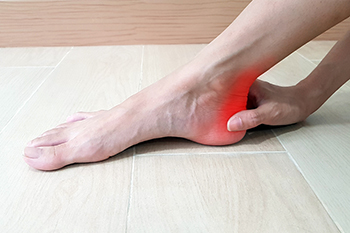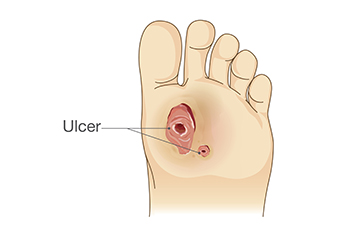Connect With Us
Blog
Items filtered by date: September 2023
MLS Laser Treatment for Tendon Pain

Tendinopathy involves inflammation in and around tendons, often resulting from injury. Low-level laser therapy, which uses monochromatic, coherent, short-wavelength light, has been used since the 1960s to treat tendon injuries. Though investigations are ongoing, some researchers exploring the success of this type of therapy for tendinopathy found that low-level laser therapy consistently shows promise in treating tendinopathy. Patients report improvements in pain, range of motion, and motor function. Combining laser therapy with exercise programs also yielded positive results. If you suffer from tendon pain in your feet or ankles, it is suggested that you make an appointment with a podiatrist to see if this type of treatment can help you.
MLS Laser Therapy is a successful alternative for treating any pain you may be experiencing related to certain podiatric conditions. If you are interested in MLS Laser Therapy, consult with one of our podiatrists from Pennsylvania Foot & Ankle. Our doctors will assess your condition and provide you with quality foot and ankle treatment.
MLS Laser Therapy
Multiwave Locked System (MLS) Laser Therapy is a patented, FDA-cleared technology that helps relieve pain and inflammation from a number of podiatric conditions, including:
- Heel Pain
- Plantar Fasciitis
- Sports Injuries
- Wounds
- Achilles Tendonitis
- Arthritis
- Neuropathy
- Neuromas
MLS Laser Therapy is an ideal alternative to surgery and prescription medication, as it has no negative side effects and encourages accelerated healing. Among its many clinical benefits, MLS Laser Therapy also:
- Reduces swelling due to bruising or inflammation
- Blocks pain
- Reduces formation of scar tissue
- Improves nerve function
If you have any questions, please feel free to contact one of our offices located in Bensalem, Pennsylvania, Port Richmond, Philadelphia, and Hamilton, New Jersey . We offer the newest diagnostic and treatment technologies for all your foot care needs.
The Basics of the Achilles Tendon

The Achilles tendon, the body's largest tendon, is susceptible to injury due to its limited blood supply and exposure to various forces. Aging and increased activity, especially in sports involving speed, heighten the risk of Achilles tendon problems. These issues are becoming more common with the active aging population. Injuries can develop suddenly or gradually, often requiring extended healing periods. A thorough history and physical examination are necessary for accurate diagnosis and tailored treatment. The primary approach for treatment involves rest and nonsteroidal anti-inflammatory drugs. Additional interventions such as physical therapy, orthotics, or surgery may be necessary in severe cases. If you have Achilles tendon pain or an injury, it is suggested that you make an appointment with a podiatrist for a proper diagnosis and treatment tailored to your situation.
Achilles tendon injuries need immediate attention to avoid future complications. If you have any concerns, contact one of our podiatrists of Pennsylvania Foot & Ankle. Our doctors can provide the care you need to keep you pain-free and on your feet.
What Is the Achilles Tendon?
The Achilles tendon is a tendon that connects the lower leg muscles and calf to the heel of the foot. It is the strongest tendon in the human body and is essential for making movement possible. Because this tendon is such an integral part of the body, any injuries to it can create immense difficulties and should immediately be presented to a doctor.
What Are the Symptoms of an Achilles Tendon Injury?
There are various types of injuries that can affect the Achilles tendon. The two most common injuries are Achilles tendinitis and ruptures of the tendon.
Achilles Tendinitis Symptoms
- Inflammation
- Dull to severe pain
- Increased blood flow to the tendon
- Thickening of the tendon
Rupture Symptoms
- Extreme pain and swelling in the foot
- Total immobility
Treatment and Prevention
Achilles tendon injuries are diagnosed by a thorough physical evaluation, which can include an MRI. Treatment involves rest, physical therapy, and in some cases, surgery. However, various preventative measures can be taken to avoid these injuries, such as:
- Thorough stretching of the tendon before and after exercise
- Strengthening exercises like calf raises, squats, leg curls, leg extensions, leg raises, lunges, and leg presses
If you have any questions please feel free to contact one of our offices located in Bensalem, Pennsylvania, Port Richmond, Philadelphia, and Hamilton, New Jersey . We offer the newest diagnostic tools and technology to treat your foot and ankle needs.
Wounds That Don't Heal Need to Be Checked
Causes of Foot Ulcers in Diabetic Patients

One of the most concerning complications of diabetes is the development of diabetic foot ulcers. A primary culprit behind diabetic foot ulcers is peripheral neuropathy, a condition where nerve damage impairs the ability to feel sensations in your feet. Without pain awareness, you may not notice the pressure your feet experience during everyday activities. This can lead to developing blisters, lesions, or sores. If these injuries are not attended to, they may evolve into foot ulcers. Another significant factor in the development of diabetic foot ulcers is poor blood flow, which can happen as a result of conditions such as peripheral arterial disease. Inadequate blood supply can hinder proper wound healing, making minor injuries prone to infections. Diabetic foot ulcers are a serious concern, and understanding the causes, in addition to taking preventive measures, can significantly reduce the risk. If you have diabetes, it is strongly suggested that you schedule regular check ups with a podiatrist who can both monitor and treat any foot problems as they arise.
Diabetic foot care is important in preventing foot ailments such as ulcers. If you are suffering from diabetes or have any other concerns about your feet, contact one of our podiatrists from Pennsylvania Foot & Ankle. Our doctors can provide the care you need to keep you pain-free and on your feet.
Diabetic Foot Care
Diabetes affects millions of people every year. The condition can damage blood vessels in many parts of the body, especially the feet. Because of this, taking care of your feet is essential if you have diabetes, and having a podiatrist help monitor your foot health is highly recommended.
The Importance of Caring for Your Feet
- Routinely inspect your feet for bruises or sores.
- Wear socks that fit your feet comfortably.
- Wear comfortable shoes that provide adequate support.
Patients with diabetes should have their doctor monitor their blood levels, as blood sugar levels play such a huge role in diabetic care. Monitoring these levels on a regular basis is highly advised.
It is always best to inform your healthcare professional of any concerns you may have regarding your feet, especially for diabetic patients. Early treatment and routine foot examinations are keys to maintaining proper health, especially because severe complications can arise if proper treatment is not applied.
If you have any questions please feel free to contact one of our offices located in Bensalem, Pennsylvania, Port Richmond, Philadelphia, and Hamilton, New Jersey . We offer the newest diagnostic and treatment technologies for all your foot and ankle needs.
Symptoms of Charcot-Marie-Tooth Disease

Charcot-Marie-Tooth disease is a cluster of inherited genetic disorders that impact the peripheral nervous system. These neuropathies disrupt the intricate network responsible for movement and sensation within the extremities, including the feet. The peripheral nervous system serves as a communication bridge between the brain, spinal cord, and muscles. Charcot-Marie-Tooth disease results in a range of symptoms that interfere with this process and dramatically influence foot health. Gradual muscle wasting in the feet and legs is a hallmark of this disease, causing increasing weakness and reduced control over time. This frequently leads to difficulties in mobility and balance. It also can result in high foot arches, known as pes cavus, and clawed toes. These structural changes can further impede proper foot function and comfort. An altered gait, often high-stepping, and a slapping sound when walking are only some of the common symptoms. Poor balance and a risk of falling are others, caused by weakened muscles and loss of sensation. Although there is no cure, it is possible to manage foot-related challenges and potentially slow down the progression of the disease. For guidance, it is suggested that you make an appointment with a podiatrist.
When dealing with systemic disease of the feet, it is extremely important to check the affected areas routinely so that any additional problems are caught quickly. If you have any concerns about your feet and ankles contact one of our podiatrists from Pennsylvania Foot & Ankle. Our doctors will assist you with all of your podiatric needs.
Systemic Diseases of the Feet
Systemic diseases affect the whole body, and symptoms usually are displayed in the feet. This condition can make a patient’s ability to walk unbearable. Systemic diseases include gout, diabetes mellitus, neurological disorders, and arthritis.
Gout – is caused by an excess of uric acid in the body. Common symptoms include pain, inflammation, and redness at the metatarsal/phalangeal joint of the base big toe. Gout can be treated by NSAIDs to relieve pain and inflammation, and other drugs that lower the acid levels in the body.
Diabetes mellitus – is an increase in the level of blood sugar that the body cannot counteract with its own insulin. Failure to produce enough insulin is a factor in Diabetes.
Diabetes of the Feet
Diabetic Neuropathy – may lead to damaged nerves and affect the feet through numbness and loss of sensation.
Peripheral Vascular Disease – can restrict the blood flow to the feet, and often times lead to amputation of the feet.
If you have any questions please feel free to contact one of our offices located in Bensalem, Pennsylvania, Port Richmond, Philadelphia, and Hamilton, New Jersey . We offer the newest diagnostic and treatment technologies for all your foot and ankle needs.
Blog Archives
- April 2024
- March 2024
- February 2024
- January 2024
- December 2023
- November 2023
- October 2023
- September 2023
- August 2023
- July 2023
- June 2023
- May 2023
- April 2023
- March 2023
- February 2023
- January 2023
- December 2022
- November 2022
- October 2022
- September 2022
- August 2022
- July 2022
- June 2022
- May 2022
- April 2022
- March 2022
- February 2022
- January 2022
- December 2021
- November 2021
- October 2021
- September 2021
- August 2021
- July 2021
- June 2021
- May 2021
- April 2021
- March 2021
- February 2021
- January 2021
- December 2020
- November 2020
- October 2020
- September 2020
- August 2020
- July 2020
- June 2020
- May 2020
- April 2020
- March 2020
- February 2020
- January 2020
- December 2019
- November 2019
- October 2019
- September 2019
- August 2019
- July 2019
- June 2019
- May 2019
- April 2019
- March 2019
- February 2019
- January 2019
- December 2018
- November 2018
- October 2018
- September 2018
- August 2018
- July 2018
- June 2018
- May 2018
- April 2018
- March 2018
- February 2018
- January 2018
- December 2017
- November 2017
- October 2017
- September 2017
- August 2017
- July 2017
- June 2017
- May 2017
- April 2017
- March 2017
- February 2017
- January 2017
- December 2016
- November 2016

